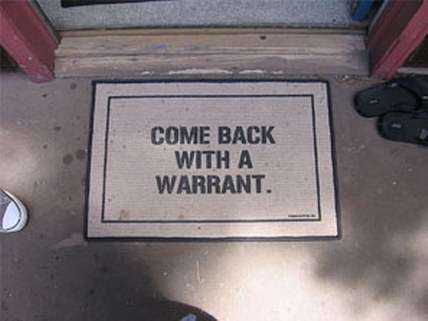'Sneak and Peek' Warrants Intended for Terrorism Mostly Used in Drug Cases

When the security state types pushed for passage of the Patriot Act, one of the measures on which they insisted was the inclusion of "sneak and peek" warrants. In the war against terrorism, they absolutely had to be able to go searching first, and provide notice to suspects later. Of course, it didn't take long for law enforcement to discover this security state tool and start putting it to very different use—mostly in the enforcement of drug prohibition. In fact, that's mostly how sneak and peeks are now used.
According to Mark Jaycox of the Electronic Frontier Foundation, "Law enforcement made 47 sneak-and-peek searches nationwide from September 2001 to April 2003. The 2010 report reveals 3,970 total requests were processed. Within three years that number jumped to 11,129."
But terrorism! And, in fact, there are a few terrorism cases mixed in there. A very few. Like, homeopathic dilution few.
Out of the 3,970 total requests from October 1, 2009 to September 30, 2010, 3,034 were for narcotics cases and only 37 for terrorism cases (about .9%). Since then, the numbers get worse. The 2011 report reveals a total of 6,775 requests. 5,093 were used for drugs, while only 31 (or .5%) were used for terrorism cases. The 2012 report follows a similar pattern: Only .6%, or 58 requests, dealt with terrorism cases. The 2013 report confirms the incredibly low numbers. Out of 11,129 reports only 51, or .5%, of requests were used for terrorism. The majority of requests were overwhelmingly for narcotics cases, which tapped out at 9,401 requests.
Maybe those very few terrorism cases really required stealthy execution of search warrants without any opportunity for suspects to seek legal counsel, challenge government actions, and defend themselves. Maybe. But now the state has applied this power to secretly seek evidence far beyond the supposed special case of terrorism—to common crimes, expecially the enforcement of drug prohibition. That application of this "anti-terrorism" measure to criminal cases is now the rule, far overshadowing its supposed purpose.
Ultimately, the Patriot Act handed a massive advantage to government officials over the people they target, and made a huge transformation in the legal system.
Come back with a warrant? Yeah. But if we don't know that they have one, it doesn't do us much good.


Show Comments (79)